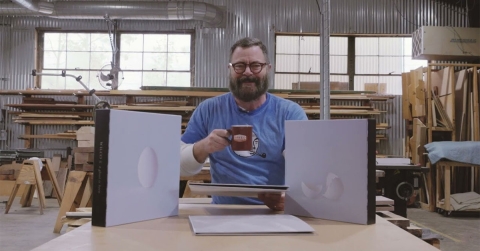Kronos Quartet and Kronos Performing Arts Association (KPAA) will present its fifth-annual, three-day hometown music festival, Kronos Festival 2019, at the SFJAZZ Center in San Francisco, May 30–June 1. This year, the festival highlights the voices of singers, storytellers, and activists over three evening concerts—including one with Nonesuch label mate Sam Amidon—a Saturday morning family concert, and Kronos Labs, free public events that are new this year.
Kronos Quartet and Kronos Performing Arts Association (KPAA) will present its fifth-annual, three-day hometown music festival, Kronos Festival 2019, at the SFJAZZ Center in San Francisco, May 30–June 1. This year, the festival highlights the voices of singers, storytellers, and activists over three evening concerts, a Saturday morning family concert, and Kronos Labs, free public events that are new this year.
During the festival, a wide range of artists will join Kronos on stage. Experimental duo CocoRosie, Malian griot singer Hawa Kassé Mady Diabaté (of Trio Da Kali), and the San Francisco Girls Chorus are all returning from last year’s festival. In addition, Nonesuch label mate Sam Amidon and folk musician Lee Knight, composer and guitarist Jherek Bischoff, writer Rebecca Solnit and filmmaker Sam Green will perform. Highlighting Kronos’s legacy of mentorship, students from the Ruth Asawa San Francisco School of the Arts once again take center stage during the festival. Valérie Sainte-Agathe, artistic director of the San Francisco Girls Chorus and frequent Kronos collaborator, will be Kronos Festival 2019’s Artist-in-Residence. Additional guests will be announced.
Kronos will debut the first part of a project, commissioned by the FreshGrass Foundation, that will commemorate the life and legacy of folk icon and activist Pete Seeger, who would have turned 100 years old this May. Kronos will also perform the Bay Area premiere of Glorious Mahalia, a work by Chicago-based composer Stacy Garrop that celebrates legendary singer Mahalia Jackson through the words and spirit of oral historian and activist Studs Terkel.
Kronos also premieres two pieces written for 50 for the Future: The Kronos Learning Repertoire. One is by Stanford University composer Mark Applebaum, whose works frequently consist of both gestural movements and sound, and another by Diabaté, whose work is inspired by the tegere tulon—a tradition of handclapping songs and dances created spontaneously by girls in country villages of southern Mali. Kronos’s 50 for the Future is a string quartet commissioning, performance, education and legacy project that is creating a library of 50 works—composed by 25 women and 25 men—designed to guide young amateur and early-career professional string quartets in developing and honing the skills required for the performance of 21st-century repertoire. During Kronos Festival 2019, scores and parts, recordings, and other pedagogical materials for five new works will be made publicly available on Kronos’s website, bringing the total number of available works to 30.
For all the details on Kronos Festival 2019 and tickets, visit kronosquartet.org.
- Log in to post comments



